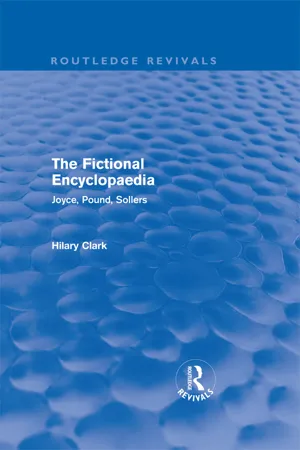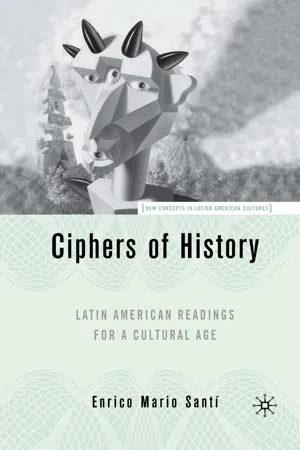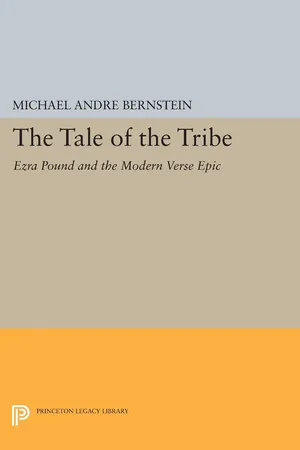Literature
Canto
A canto is a section or division of a long poem, typically one that is epic in nature. It is often used in works such as Dante's "Divine Comedy" and Lord Byron's "Don Juan". Cantos are usually numbered and can be seen as individual chapters within a larger narrative.
Written by Perlego with AI-assistance
Related key terms
1 of 5
3 Key excerpts on "Canto"
- eBook - ePub
The Fictional Encyclopaedia (Routledge Revivals)
Joyce, Pound, Sollers
- Hilary Clark(Author)
- 2018(Publication Date)
- Routledge(Publisher)
CantosThe Canto form
The form of the Cantos has implications for our study of the fictional encyclopaedia. The Canto involves a tension between orality and writing, between popular and hermetic knowledge. Further, even the encyclopaedic conflict between totalization and incompletion is played out in this form.A Canto is a subdivision of an epic or narrative poem, roughly corresponding to a chapter in a novel.1 Dante’s Commedia , for example, is divided into Cantos. Pound’s Cantos , in utilizing these divisions, thus takes its place in the tradition of epic narrative. And yet Pound valued the medieval lyric over medieval narrative: “The problem rises: how far all this medieval narrative was literature of escape…The vitality of the medieval lyric was perhaps due to its focusing attention on what was ‘present’.”2 Pound’s “epic” belongs equally to the tradition of lyric poetry, particularly song (the word “Canto” derives from the Latin word “cantus” or “song”). There is thus a tension, at the heart of the Cantos , between narrative--an Odyssean journey through history-and lyric moments of vision outside time. The poem ultimately overcomes the dichotomy between narrative and lyric, as both modes become means of access to paradisal states of being.Pound, in his studies of Romance literature, gravitates by preference to the lyrics of the Troubadours, especially Amaut Daniel.3 In translating and celebrating these lyrics, Pound emphasizes their formal intricacy (rare rhymes and complex rhyme-schemes), their musical qualities (internal echoes of assonance and alliteration), and their fineness of spirit as meditations on love both mystical and carnal. The Troubadours’ notion of paradise as involving feminine beauty, a beauty both sacred and secular, is relevant to the form of the Cantos - eBook - PDF
Latin American Readings for a Cultural Age
Latin American Readings for a Cultural Age
- E. Santi(Author)
- 2016(Publication Date)
- Palgrave Macmillan(Publisher)
24 Ciphers if History Tedious though it may be to detail such contexts at the outset, they provide a database for my full reading later, where context weaves into text. I choose this time a more generalized reading that emphasizes the role of context in the text's decipherment, less focused, admittedly, than the one I attempted years ago in my book on Neruda's prophetic imagination.! Neruda's tenth organic book, one of his longest, most crafted and the one he avowedly loved best, was also his best-known, owing in great measure to the scandal amidst which he finished writing it while being pursued by the Chilean police for publicly challenging his country's president. Its contents range from masterpieces (The Heights of Macchu Picchu) to sectarian doggerel (Let the Woodcutter Awaken). He once referred to it as "my most important book."z The synoptic, monumental features of Canto general have often earned it comparison with masterworks from religion (The Bible, Popol Vuh), literature (The Divine Comedy, Leaves of Grass), and painting (Renaissance frescoes, Mexican Muralism), with all of which it shares expansive range. Indeed, Canto general is a poetic encyclopedia that gathers together multiple themes, genres and techniques, its sole formal unity deriving from the theme of America. As such, it caps a venerable tradition, dating back to the nineteenth century, that Gordon Brotherston once called "the Great Song": a poem of hemispheric dimensions that identifies morally and geographically with the entire American continent. 3 Were one to concentrate solely on the book's first five sections, a linear sequence spanning from prehistoric origins to the rise of twentieth- century dictatorships, one could conclude that Canto general is simply a verse narrative of political history. Beginning with its Section VI, how- ever, a series of poems foreign to that design interrupts the sequence, and the reader is led elsewhere. - eBook - PDF
The Tale of the Tribe
Ezra Pound and the Modern Verse Epic
- Michael André Bernstein(Author)
- 2014(Publication Date)
- Princeton University Press(Publisher)
172 · THE CantoS ing and available for communal use without necessarily being fully realized in any single individual's competence. Ideally, within the fiction of the poem, the question of "reliability" does not arise, since there is no one "character," no "knowing subject," or even omniscient author, through whom the nar- rative is being communicated. In the most literal sense it is only the poem in its prolonged unfolding which undertakes the quest announced in Canto I. Or, to put the matter some- what differently, Odysseus is only one particular, although the most frequently presented, configuration of the narrative discourse: it is The Cantos which "sings" him and not the other way around. "Flaubert... en maniant une ironie frappee d'incertitude, opere un malaise salutaire de l'ecriture: il n'arrete pas Ie jeu des codes (ou l'arret mal), en sorte que (c'est la sans doute la preuve de l'ecriture) on ne sait jamais s'il est re- sponsable de ce qu'il ecrit (s'il y a un sujet derriere son Ian- " Q gage 9 Although Barthes is describing the decisive rupture in the narrative strategy of conventional novels inaugurated by Gus- tave Flaubert, many of the same critical terms apply to the way historical exempla are presented in Pound's text, and in the face of so radical an aesthetic it seems merely trivializing to read the poem as a looser, more episodic, version of tradi- tional verse narratives. It is precisely in those sections de- prived of any easy recuperation through a definable narrator or point of view that the poem most fully asserts itself as an epic, that the writing reaches a structural independence from what Pound himself had called the "medievalism" of Joyce's Homeric parallels (L£:406).
Index pages curate the most relevant extracts from our library of academic textbooks. They’ve been created using an in-house natural language model (NLM), each adding context and meaning to key research topics.


